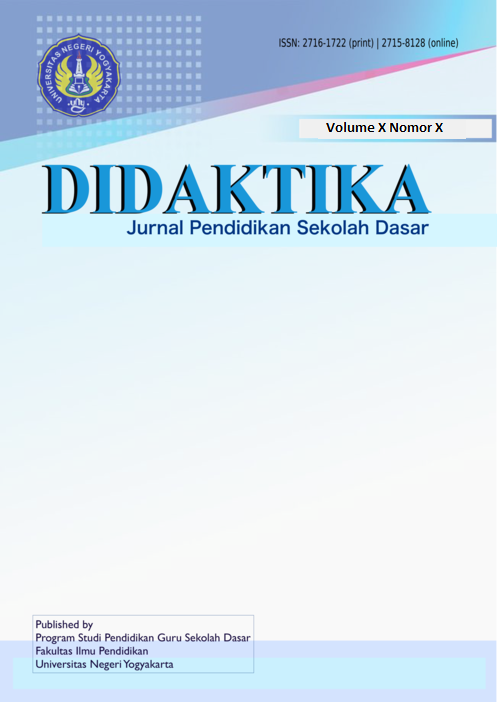Implementasi Model Pembelajaran POE (Predict, Observe, Explain) dengan Mengintegrasi Teknologi dalam Mengkonstruk Technological Literacy Mahasiswa Calon Guru IPA Sekolah Dasar
DOI:
https://doi.org/10.21831/didaktika.v2i1.28093Abstract
This research was conducted to test the effectiveness of the application of the learning model of POE (Predict, Observe, Explain) by integrating technology in constructing technological literacy of elementary school science teacher candidates. The study was conducted by comparing learning using the POE model by integrating technology in the experimental class with without integrating technology in the control class. The research method used was a quasi-experimental research design with The Randomized Pretest - Posttest Control Group Design. The sample of this research is the students of elementary science teacher candidates selected by cluster random sampling. The research instrument used in the form of a test device to measure technological literacy with a reliability index of 0.94. The results showed that significantly learning using the POE model by integrating technology was more effective in increasing technological literacy compared to learning without integrating technology.
References
Blazely, L. D. et. al. (1997). Science Study. Jakarta: The Japan Grant Foundation.
Chandra, D. T. (2010). Kajian Efektivitas Pembelajaran Fisika Melalui Pendidikan Teknologi Dasar (PTD) di Sekolah Menengah Pertama (SMP). Makalah Pendidikan Fisika UPI: tidak diterbitkan.
Depdiknas. (2006). Kurikulum Tingkat Satuan Pendidikan Sekolah Menengah Pertama. Jakarta: Depdiknas.
Fraenkel, J. R., & Wallen, N. E. (1993). How to Design and Evaluate Research in Education (second ed.). New York: Graw-Hill Book Co
Hake, R. R. (1998). Interactive Engagement Methods In Introductory Mechanics Courses. Tersedia : http://www.physics.indiana.edu/~sdi/IEM-2b.pdf. Accessed on [24 November 2012]
ITEA. (2000). Standards for Technological Literacy: Content for the Study of Technology. Technological for All Americans Project.
Mergendoller, J. R., & Thomas, J. W. (2000). Managing Project Based Learning : Principles from The Field. Novato, CA : Buck Institute for Education.
Undang-undang Republik Indonesa Nomor 12 tahun 2012 tentang Pendidikan Tinggi.
Wahyudin, dkk. (2008). Pengantar Pendidikan. Jakarta: Universitas Terbuka
Warsono. & Haryanto. (2016). Pembelajaran Aktif: Teori dan Asesmen. Bandung: PT.Remaja Rosdakarya.
Downloads
Published
How to Cite
Issue
Section
Citation Check
License
- Authors retain copyright and grant the journal right of first publication with the work simultaneously licensed under a Creative Commons Attribution License that allows others to share the work with an acknowledgement of the work's authorship and initial publication in this journal.
- Authors are able to enter into separate, additional contractual arrangements for the non-exclusive distribution of the journal's published version of the work (e.g., post it to an institutional repository or publish it in a book), with an acknowledgement of its initial publication in this journal.
- Authors are permitted and encouraged to post their work online (e.g., in institutional repositories or on their website) prior to and during the submission process, as it can lead to productive exchanges, as well as earlier and greater citation of published work.






